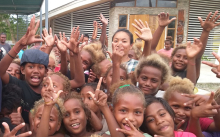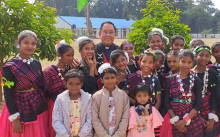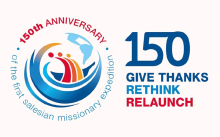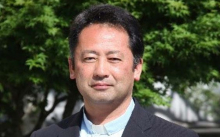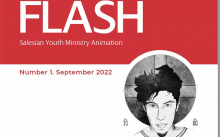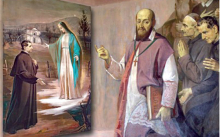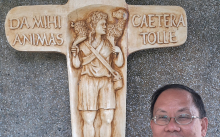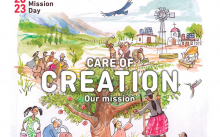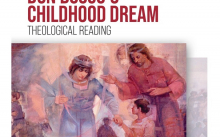
By Fr. Alfred Maravilla SDB
General Councillor for Missions
RMG, 14 February 2024 -- Indigenous people represent about 5% of the world's population. The 2014 UN report states that 70% of the world’s indigenous peoples live in Asia. Irrespective of their legal status or the terminology used, many indigenous peoples of Asia experience non-recognition of their cultural identity, exclusion, and marginalization. A majority of the population in almost all Oceania countries is indigenous.
For thousands of years, indigenous peoples have followed ways of life that show great respect for creation because they understand it as a legacy from their ancestors that they have to pass on to the coming generations. For them, land is a gift from the Creator and from their ancestors who rest there, a sacred space with which they need to interact if they are to maintain their identity and values. (cf. Laudato Si, 146). This deep connection with creation inspires its care and respect. This led them to develop a treasury of practical wisdom for the care and protection of fragile ecosystems and reap the potential benefits of herbs and plants for the human body. They developed a strong sense of family and community and have bonds honoring their elders and caring for the little ones. Their traditional beliefs, cultural practices, and worldview express their recognition of a Supreme Being. Some of their cultural practices and superstitions may demean human dignity. Still, many of their customs and traditions give great importance to social values which are centered on concern for others. Indeed, their richness is also our own!
Indigenous peoples have often been made to feel like unwelcome intruders in their own land, with little attention given to their specific needs. In many parts of the world logging, large-scale mining, human trafficking, and infrastructure projects cause irreparable damage to indigenous communities and cultures, gross human rights violations, and even the death of those who oppose these projects. Governments often choose to be blind and deaf to the cries of indigenous people who depend on the forests and their agricultural lands for their sustenance and very existence. Their right to revitalize, use, develop and transmit to future generations their cultures, languages, traditions, and worldviews are often not guaranteed.
In the course of history, numerous bishops, priests, and religious and lay faithful gave their lives in the defence of the dignity of indigenous peoples so that they may know Jesus Christ and his Gospel. They have condemned violence, oppression, social injustice and slavery. The Catholic Church has stressed that the “doctrine of discovery” – a theory that served to justify colonizers expropriating indigenous lands from their rightful owners and granting such “rights” to colonizing powers – has never been a part of the Catholic Church’s Magisterium. However, it is a fact that Church documents of that time did not always adequately reflect the equal dignity and rights of indigenous peoples. Thus, they were often manipulated for political purposes by competing colonial powers. Similarly, most colonizers had the idea that one culture (particularly their European culture) was superior to others. Consequently, some considered it legitimate to employ various ways of ‘civilizing’ or coercing indigenous peoples. Immoral acts were carried out against them, at times, without opposition from religious leaders (cf. Statement on Doctrine of Discovery, n.2-9). Hence, “it is necessary to acknowledge in all sincerity the abuses committed due to the lack of love on the part of those persons who were unable to see indigenous peoples as their brothers and sisters, as children of the same Father.” (St. John Paul II, Santo Domingo, 13 Oct 1992).
Our concern for indigenous peoples is not in support of any ideology or lobby groups. It is rooted, instead, in our fundamental identity as beings created in the image and likeness of God, which is deeper than any indigenous identity. From this flows their rights based on their indigenous origin or identity. Thus, the Church embraces indigenous peoples with their cultures so that they may discover the points of agreement between their indigenous values and traditions and the teachings of Jesus Christ. This dialogue teaches us to appreciate our inalienable responsibility to preserve the environment, natural resources and our own culture and traditions in the excellent manner they have done. They, in turn, are helped to discover the reflections of ‘the ray of that Truth which enlightens all’ (NA, 2) in their indigenous values, cultures and traditions.
The most important program that serves indigenous peoples is helping them to become wholly human, according to the image God has of us and to which he calls us. This also involves inviting them to a friendship with Jesus Christ that fully humanizes, integrally dignifies persons, and brings fulfillment to every heart and the whole of life (QA 62-65, 76). Don Bosco sent his missionaries to the indigenous people of Patagonia. Later, other Salesians worked among other indigenous peoples. Today, Salesians actively preserve and promote their identity by establishing cultural museums, writing dictionaries and books, and offering activities and programs that foster their integral evangelization. Indeed, our work among indigenous peoples is an important expression of Salesian commitment to the poor and marginalized.

 6363_Promoting Sustainable Integral Human Development
6363_Promoting Sustainable Integral Human Development
 6273_150th anniversary of the Salesian Missions: a primer for...
6273_150th anniversary of the Salesian Missions: a primer for...
